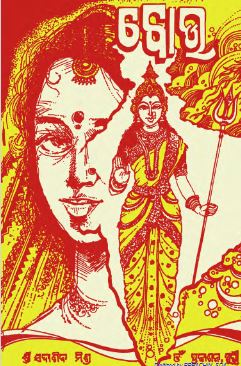In the rich landscape of Odia literature, Sadasib Misra’s 2002 novel “Bou” stands as a monumental work that delves deep into the social fabric and emotional intricacies of rural Odisha. This novel is much more than a mere story; it’s a poignant exploration of womanhood, family, and the ceaseless cycle of sacrifice and resilience.
The term “Bou” translates to “bride” or “wife” in English, but in the context of this novel, it signifies far more. It encapsulates the myriad roles played by women in a traditional Odia household — a nurturer, a caregiver, and often, the silent sufferer. Misra’s narrative revolves around the protagonist, Janaki, whose journey from a naïve bride to a strong matriarch is tear-jerking yet empowering.
Janaki’s character is symbolic of many women in rural India, who endure and overcome countless struggles. From the day she enters her husband’s house, her life is a continuous string of sacrifices. Yet, Janaki’s story is not one of victimhood but of triumph over adversity. Misra has crafted her character with such depth that she becomes a representative of every woman who has ever had to fight for her family’s well-being while subduing her own desires and dreams.
The novel’s setting is a village in Odisha, which Misra describes with such vividness that readers are transported to its lush fields, bustling markets, and humble homes. This backdrop is not merely a setting but an active participant in the narrative. It shapes the lives of the characters and adds a layer of authenticity to their struggles and triumphs.
One of the most striking elements of “Bou” is Misra’s use of language. His eloquent prose, interspersed with local dialects and phrases, lends an authentic voice to the characters. Misra’s writing is both lyrical and raw, painting a realistic portrait of rural life while capturing the innermost thoughts and emotions of his characters.
Family dynamics are at the core of “Bou”, with every relationship Janaki engages in adding a new level of complexity to the story. Her bond with her husband, children, and in-laws provides insights into the cultural and social norms that dictate behavior and relationships in traditional Odia households. These relationships are not always harmonious, and Misra doesn’t shy away from depicting the conflicts and tensions that arise.
Furthermore, Misra touches upon themes of patriarchy, gender roles, and societal expectations. Through Janaki’s life, he critiques the rigid structures that often limit women’s freedom and agency. However, the novel is not merely a critique but also a celebration of the indomitable spirit of women. Janaki’s resilience in the face of hardships stands as a testament to the strength that women draw from within to navigate their worlds.
As the narrative progresses, the readers witness Janaki evolving from a subdued, compliant wife into a pillar of strength for her family. Her transformation is gradual yet powerful, underscoring the idea that true strength lies in perseverance and self-belief.
In conclusion, “Bou” by Sadasib Misra is a masterfully woven narrative that offers a deep and moving insight into the lives of rural Odia women. It’s a story of enduring love, undying spirit, and the silent but profound battles fought by women every single day. Misra’s “Bou” is not just a novel; it’s an ode to every woman who stands tall against the tides of time with grace and grit. For anyone looking to explore the depths of Odia literature, “Bou” is an indispensable read that will linger in your heart long after the last page is turned.
Books Info
| Books name | Bou |
| Editor | Sadasib Misra |
| No Of pages | 57 |
| Publisher | Om Prakashana |
| Publication | 2002 |
| Printed At | Ramapress |
| Distributor | NA |

